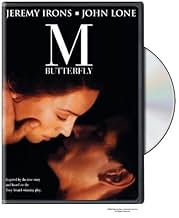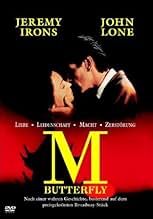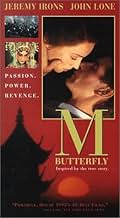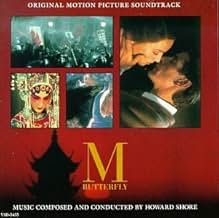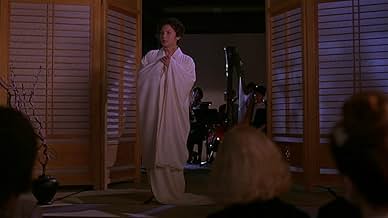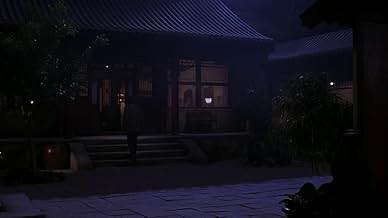In 1960s China, French diplomat Rene Gallimard falls in love with an opera singer, Song Liling - but Song is not at all who Gallimard thinks.In 1960s China, French diplomat Rene Gallimard falls in love with an opera singer, Song Liling - but Song is not at all who Gallimard thinks.In 1960s China, French diplomat Rene Gallimard falls in love with an opera singer, Song Liling - but Song is not at all who Gallimard thinks.
- Awards
- 1 win & 1 nomination total
Featured reviews
Jeremy Irons plays the lead role as French diplomat, Phillipe Bouriscot, who falls in love with an absolutely seductive Chinese woman opera singer (John Lone). As Irons pursues the diva he's attracted to, she toys with his foreign ignorance of the cultural differences between their Western & Eastern societies.
In a sense, she keeps the diplomat at a distance for 18 years while their affair continues by becoming his teacher of cultural difference. The romantic & erotic chemistry between the diplomat & opera singer is a very famous true story written by David Henry Hwang--"Madame Butterfly." There have been numerous stage & screen renditions of the story.
I like this (1994) version best because David Cronenberg is undoubtedly the finest director to deal with the most important topic in the story: gender bending. "M. Butterfly" is the Canadian Cronenberg's first Hollywood funded debut. The surprise plot of the sorted true love story is one of espionage. An adults only film, it is one of intrigue, sizzling romance, twists & turns, deception & betrayal.
In a sense, she keeps the diplomat at a distance for 18 years while their affair continues by becoming his teacher of cultural difference. The romantic & erotic chemistry between the diplomat & opera singer is a very famous true story written by David Henry Hwang--"Madame Butterfly." There have been numerous stage & screen renditions of the story.
I like this (1994) version best because David Cronenberg is undoubtedly the finest director to deal with the most important topic in the story: gender bending. "M. Butterfly" is the Canadian Cronenberg's first Hollywood funded debut. The surprise plot of the sorted true love story is one of espionage. An adults only film, it is one of intrigue, sizzling romance, twists & turns, deception & betrayal.
Of all the David Cronenberg movies I have seen 'M. Butterfly' is my least favourite, but that's certainly not to say that it is entirely worthless. Despite some flaws and a few dead spots it is still quite a fascinating film. One of the oddest things about this movie is that despite its general feeling of unbelievability it is based on a true story. Cronenberg adds to this by deliberately casting the rather butch John Lone, rather than a more obviously androgynous actor (ala 'The Crying Game', a movie this is often compared to). This makes the story more confronting and less comfortable, and also one assumes, closer to the actual facts of the case. Jeremy Irons, who was robbed of an Oscar in Cronenberg's previous 'Dead Ringers', is outstanding as usual, Lone (still mainly known for 'The Last Emperor') isn't as good, but still fine, and the supporting cast includes a nice turn from Brit veteran Ian Richardson ('Dark City'). Most Cronenberg fans will probably find this a bit difficult to get into, as the material isn't exactly typical of the director, but it's much better than its bad press makes out. I expected to hate it, and I didn't.
Jeremy Irons and John Lone (who plays the character, Song Liling) should both have gotten academy awards for their performance in this incredibly enigmatic and captivating scorcher of a movie. This is a completely new twist on on the classic opera and may even be more of a believable story because it is so creatively wicked. It has a sexual tension that holds throughout the whole movie and is entirely played out in the mind and sensuously mesmerizing at the same time.
It's an emotionally tortuous journey that Jeremy Irons makes in the name of love (?), and more likely addicted passion. John Lone's performance is exceptional as one who is just as driven and hooked psychologically in his own way as what it is in him that drives him to fulfill Jeremy's ecstasy and descent into irretrievable madness.
Definitely one of the best movies ever! I hope this makes it to DVD sometime soon as it surely deserves to be seen again and again.
It's an emotionally tortuous journey that Jeremy Irons makes in the name of love (?), and more likely addicted passion. John Lone's performance is exceptional as one who is just as driven and hooked psychologically in his own way as what it is in him that drives him to fulfill Jeremy's ecstasy and descent into irretrievable madness.
Definitely one of the best movies ever! I hope this makes it to DVD sometime soon as it surely deserves to be seen again and again.
Jeremy Irons has specialised for many years in playing characters who build up a world of their own, and then have the world fall to pieces around them; who destroy themselves internally. This is the key characteristic for his parts in Damage, Cronenberg's Dead Ringers, Lolita (of course) and M. Butterfly. In this movie, however, it slightly misses the true impact of such events Irons has exhibited so well in those other parts, mainly because the final "revelation" actually doesn't happen until after Gallimard's world has already collapsed, with Butterfly's arrest (by the Red Guard, as an artist and thus a criminal) and his own recall to Paris. But he doesn't find out the truth about his Butterfly until the court case, where Irons is unable to react - he has to react without reacting, so to speak, and he just sits there looking as if he'd just bitten into a thistle. Were I to write the screenplay, I would have changed some of the order of events. It is not important to the movie that Gallimard learn of the true nature of his lover in the court room, so I would have that revelation earlier, thus completing the cycle of destruction we have seen in his life, and also avoiding that impossible ride in the police van near the end of the film. (First of all, it is impossible that two co-defendants in an espionage case would be transported together, secondly it is impossible that they be alone without a guard in the back, and thirdly it is quite impossible that the guards in the front of the van would not have noticed that one of the prisoners has taken off all his clothes!) Certain other elements also detracted from the movie. It does not do an avowedly art house film any good to Hollywood-ise things up by having Chinese people talk to Chinese people in heavily accented English.
And in the end, what was achieved? This case, as is pointed out in the film, was a national joke in France. Presumably Hwang didn't give the case the comedy treatment because he saw something deeper, something to learn about human nature. But in fact we learn very little about human nature that wasn't already obvious - the idea of subsuming one's whole being to an image of perfection; the inability to love the creator of an image if one has loved the image and discovered it to be nothing. All this is too obvious. Some merit might have been retrieved if it could be shown that Gallimard was intentionally deceiving himself, but that is clearly not the case.
An "ordinary" movie from David Cronenberg transpires to be almost too ordinary.
And in the end, what was achieved? This case, as is pointed out in the film, was a national joke in France. Presumably Hwang didn't give the case the comedy treatment because he saw something deeper, something to learn about human nature. But in fact we learn very little about human nature that wasn't already obvious - the idea of subsuming one's whole being to an image of perfection; the inability to love the creator of an image if one has loved the image and discovered it to be nothing. All this is too obvious. Some merit might have been retrieved if it could be shown that Gallimard was intentionally deceiving himself, but that is clearly not the case.
An "ordinary" movie from David Cronenberg transpires to be almost too ordinary.
The shock and awe of his particular brand of horror might be what put Cronenberg on the map, but the qualities of any great director can't be boxed in by genre. This is decidedly the case with Cronenberg.
This seemingly straight forward spy drama, is the perfect framework for the Cronenbergian exploration of omnisexuality and man's ability to evolve beyond convention and conviction, into something uniquely other and uniquely beautiful. It's the emotional equivalent to his body horror movies, and as such distinctly different but nonetheless familiar.
Having seen all but his latest movie, I find it safe to say that David Cronenberg is the most fascinating and continually surprising director I have ever encountered. I simply love that crazy old guy.
This seemingly straight forward spy drama, is the perfect framework for the Cronenbergian exploration of omnisexuality and man's ability to evolve beyond convention and conviction, into something uniquely other and uniquely beautiful. It's the emotional equivalent to his body horror movies, and as such distinctly different but nonetheless familiar.
Having seen all but his latest movie, I find it safe to say that David Cronenberg is the most fascinating and continually surprising director I have ever encountered. I simply love that crazy old guy.
Did you know
- TriviaDavid Cronenberg loved the play so much that when he heard a movie was being made about it, he volunteered immediately to direct it.
- GoofsThe word accordion is misspelled "accordian" in the closing credits.
- Quotes
Song Liling: The days I spent with you were the only days I ever truly existed.
- How long is M. Butterfly?Powered by Alexa
Details
Box office
- Budget
- $17,000,000 (estimated)
- Gross US & Canada
- $1,498,795
- Opening weekend US & Canada
- $57,280
- Oct 3, 1993
- Gross worldwide
- $1,498,795
- Runtime
- 1h 41m(101 min)
- Color
- Sound mix
- Aspect ratio
- 1.85 : 1
Contribute to this page
Suggest an edit or add missing content


